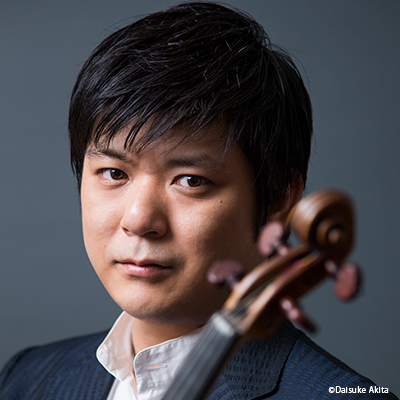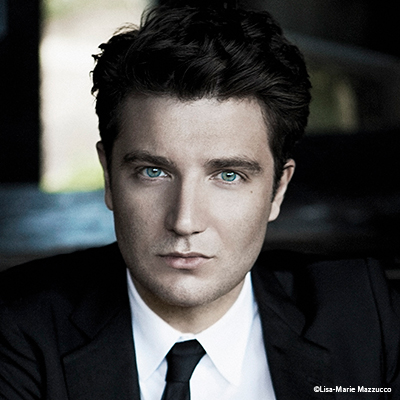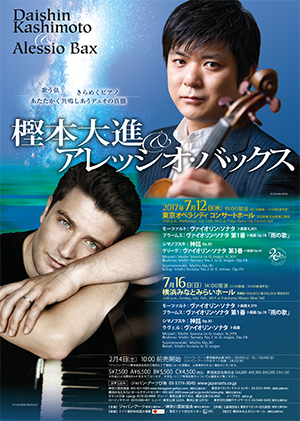Daishin Kashimoto & Alessio Bax
- Date
- 2017/7/12(Wed) 19:00
Ticket InformationTicket Information
[Purchase tickets]
Tickets can be purchased either by phone or online.
Internet
Buy Tickets Online
Telephone
Japan Arts Pia Call Center: 03-5774-3040
(Open 10:00 a.m. – 6:00 p.m. daily, except in the New Year holiday period)
*To order from the call center, you must be able to provide a mailing address
in Japan or pick up the tickets at a convenience store in Japan.
Please read the following link before purchasing tickets.
How to purchase tickets
Ticket Availability
Available / × None
Special discount
- ◎シニア・チケット=65歳以上の方はS席とA席が会員料金でお求めいただけます。
- ◎車椅子の方は、本人と付き添いの方1名までが割引になります。(ジャパン・アーツぴあコールセンターでのみ受付)
その他プレイガイド
- チケットぴあ t.pia.jp 0570-02-9999
[Pコード●●●-●●●] - イープラスeplus.jp
- ローソンチケット0570-000-407[Lコード●●●]
- 東京文化会館チケットサービス https://www.t-bunka.jp/tickets/ 03-5685-0650
- サントリーホールチケットセンター https://www.suntory.co.jp/suntoryhall/purchase/ 0570-55-0017
- 紀尾井ホールチケットセンター https://kioihall.jp/tickets 03-3237-0061
- 東京オペラシティチケットセンター https://www.operacity.jp/concert/ticket/ 03-5353-9999
- 横浜みなとみらいホールチケットセンター http://minatomirai.pia.jp/ 045-682-2000
チケット購入にあたっての注意事項
ProgramProgram
Mozart: Violin Sonata in G major, K. 301
Brahms: Violin Sonata No. 1 in G major, Op. 78
– – – – – – – – – – – – – – – – – – – – – – – – – – –
Szymanowski: Myths Op. 30
Grieg: Violin Sonata No. 3 in C minor, Op. 45
ProfileProfile
Daishin Kashimoto, Violin

Daishin Kashimoto was first prize winner of such renowned competitions as the 6th Menuhin International Junior Violin Competition in England in 1993, the International Competition for Violinists in Cologne in 1994 (where he was the youngest participant), and, in 1996, both the International Fritz Kreisler Violin Competition in Vienna and the Marguerite Long-Jacques Thibaud International Competition for Piano and Violin in Paris.
He has received a number of prestigious awards, such as the Arion Award (1995); both the Idemitsu and Mobile Music Awards (1997); the Fresh Artists Award of the Nippon Steel Music Awards (1998); The Minister of Education, Culture, Sports, Science and Technology’s Art Encouragement Prize for New Artists (1998); the Cultural Award from Hyogo Prefectural Government (2011); the Change Maker 2011 award in Japan; and the Steigenberger and Davidov Awards in Germany.
A Japanese national born in London in 1979, Daishin Kashimoto began studying violin in Tokyo at the age of three under Kumiko Eto. He moved to New York in 1985, and in the following year was accepted as the youngest student in the pre-college division of The Juilliard School, where he studied under Naoko Tanaka and received the Edward John Noble Foundation Scholarship. In 1990 he moved to L?beck, Germany, to accept an invitation to study under Prof. Zakhar Bron. From age 20 he studied under Prof. Rainer Kussmaul at Staatliche Hochschule f?r Musik in Freiburg, and completed the master’s course there, winning the Gustav Scheck prize.
He has been recognized internationally for performing under renowned Maestros such as Seiji Ozawa, Lorin Maazel, Yuri Temirkanov, Vladimir Fedoseev, Evgeny Svetlanov, Michel Plasson, Semyon Bychkov, Eliahu Inbal, Mariss Jansons, Lord Yehudi Menuhin, Myung-Whun Chung, Mikhail Pletnev and others.
Daishin is also active in the field of chamber music, and has performed with noted musicians such as Martha Argerich, Itamar Golan, Yuri Bashmet, Gidon Kremer, Mischa Maisky, G?rard Causs?e, Paul Meyer, Emmanuel Pahud, Eric Le Sage, and others.
On January 22, 2007, he was chosen to perform at a special concert aimed to develop the relationship between China, Korea, and Japan, and performed chamber music with the H.I.H. Crown Prince Naruhito of Japan (viola) and Myung-Whun Chung (piano), together with Jing Zhao and Dong-Hyuck Ahn.
Since 2007, Daishin has served as music director at annual chamber music festival “Le Pont” in Ako and Himeji in Japan.
Daishin was appointed as the first concertmaster of the Berliner Philharmoniker in 2010. He performed also as a soloist with Berliner Philharmoniker under the baton of Sir Simon Rattle and Andris Nelsons. In addition, he is a member of the Philharmonic Octet Berlin.
As a recent project as a soloist, from 2010 to spring 2013, Daishin performed and recorded all of the Beethoven violin sonatas together with pianist Konstantin Lifschitz, and they received high praise for their concerts throughout Japan spanning three tours. The complete CD box of Beethoven: Complete Violin Sonatas, released worldwide on Warner Classics in January 2014.
He plays on a violin made by Andrea Guarneri, 1674.
Alessio Bax, Piano

Pianist Alessio Bax, First Prize winner at the Leeds and Hamamatsu international piano competitions, is a 2009 Avery Fisher Career Grant recipient.
He has appeared as soloist with over 100 orchestras worldwide, including the London Philharmonic, Houston Symphony, NHK Symphony in Japan, St. Petersburg Philharmonic under Yuri Temirkanov, and the City of Birmingham Symphony Orchestra with Sir Simon Rattle.
Recent highlights include return engagements with the Dallas Symphony under Jaap van Zweden and the Royal Philharmonic on tour, performances with Los Angeles Chamber Orchestra under Hans Graf and London’s Southbank Sinfonia led by Vladimir Ashkenazy, tours with Joshua Bell, and concerts with the Chamber Music Society of Lincoln Center in both New York and Boston. Among festival appearances are London’s International Piano Series, England’s Aldeburgh and Bath festivals, Switzerland’s Verbier, the Ris?r Festival in Norway, Germany’s Ruhr Klavier-Festival and BeethovenFest, and the U.S.’s Bravo!
Vail, Music@Menlo, and Santa Fe Chamber Music Festival. Mr. Bax’s acclaimed discography includes Beethoven’s’Hammerklavier’and’ Moonlight’ Sonatas (Gramophone’Editor’s Choice’); Bax & Chung, featuring Stravinsky’s four-hand P?trouchka; Mozart’s Piano Concertos K. 491 and K. 595; Alessio Bax Plays Brahms (Gramophone’Critic’s Choice’); Rachmaninov: Preludes and Melodies (American Record Guide’Critics’Choice’); Bach Transcribed; and Baroque Reflections (Gramophone’Editor’s Choice’).
At age 14, he graduated with top honors from the conservatory of his hometown, Bari, Italy, and after further studies in Europe moved to the U.S. in 1994. A Steinway artist, Mr. Bax resides in New York City with his wife, pianist Lucille Chung, and their daughter.
Hosts
Presents by Japan Arts
Cosponsorship by Tokyo Opera City Cultural Foundation
Supported by Supported by Embassy of the Federal Republic of German Goethe-Institut


